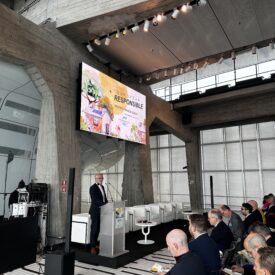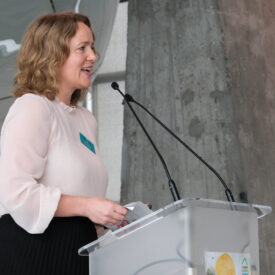18 November 2024, Milan — As the housing crisis continues to intensify across Europe, policymakers, financial experts and community-led housing providers at the European Responsible Housing Finance Summit in Milan called for a robust EU financial commitment to public, cooperative, and social housing. Hosted by Housing Europe and the voice of Italian cooperatives, Legacoop Abitanti, the summit emphasised the urgent need for dedicated EU funding to support fair, decent, affordable housing across all 27 Member States, aiming to create a fairer market and meet the critical demand for accessible homes.
Strengthening responsible investment for long-term social value
To ensure housing solutions that would endure for future generations, summit participants urged the EU and governments to invest in ways that foster long-term social impact, protecting communities from short-term, speculative interests. Leaders also advocated for the standardisation of eligible activities across EU funds, particularly in low-income urban areas, and for enabling the combination of different funds to improve access.
Bent Madsen, President of Housing Europe, emphasised, “Public and social housing, and cooperatives have been dedicated to developing affordable housing solutions that serve people for decades, aligning with the fair energy transition and vital social goals. This historical attention to housing by the EU must offer funding only to players who promote enduring social equity and stability.”
The annual meet-up of the European Responsible Housing Finance Working Group set up in 2023 by Housing Europe is to develop capacity across Europe to create healthy housing ecosystems that are able to provide sustainable, long-term solutions. On November 18, this summit uncovered novel and replicable financial solutions – from alternative funding to sustainable business models – that work for the people and communities with a focus on revolving funds practices and long-term coordinated methods.
Attilio Dadda, Legacoop Lombardia President : stressed that ”Housing Cooperatives in Lombardy are an answer to the demand for housing at sustainable prices, especially in the Milan area, where urban regeneration processes represent an opportunity to pursue a sustainable city model and where there is a large number of cooperative undivided properties historically located in the territory (about 17k dwellings). This model allows a mix of cooperative and public financial resources and has unique characteristics: intergenerationality, mutuality, social management, and services to the communities of residents. For a better idea of living which puts people, communities and their needs at the centre, for a city as accessible as possible.
Novel models for long-term sustainable financing – a financial aggregator in Italy and an alliance in France
Legacoop Abitanti has put forward a proposal of a Financial Investment Platform that should act as a financial aggregator for social housing in Italy, aiming to develop 20,000 rental homes—equivalent to 40% of the identified need. The proposed dwellings will each span approximately 70-80 square metres, available for long-term rent at an affordable rate of €350 to €450 per month (or between €60 and €75 per square metre annually).
The total investment is projected at €4.956 billion, supported by €3.46 billion in debt and a €1.496 billion public contribution (including €600 million in direct funding and €896 million in land, fees, and planning support). The financial structure combines public (34%) and private (66%) funding, with the platform aggregating resources from various debt sources.
Rossana Zaccaria, President of Legacoop Abitanti, explained: “Our vision is for a multi-year intervention plan that meets the rising demand for affordable housing. This platform should bring together public and private resources at national and European levels, enabling housing cooperatives and other providers to deliver sustainable rents across Italy. By leveraging public assets and regional partnerships, we aim to establish a stable, affordable housing supply for the country.
With the proposal, Legacoop Abitanti wanted to provide its own contribution having already started an important discussion with the main national stakeholders – from the business world to the institutions – to identify points of convergence and acquire useful contributions for the definition of an organic proposal that can become an element of dialogue with the Government and different public institutions potentially involved.
In 2020, the Caisse des Dépôts (CDC), the European Investment Bank (EIB), and the CEB, together with the Union Sociale pour l’Habitat (USH) launched the “European Alliance for Sustainable and Inclusive Social Housing” partnership in France. This initiative facilitates fair and equitable access to European funding, supporting investment projects by French social housing operators. Since its creation, the Alliance has mobilised €3 billion for financing sustainable, social and affordable housing.
The social surface of housing
In his address, Johannes Böhmer, the Vice-Governor of the Council of Europe Development Bank (CEB), emphasised the need to prioritise working towards sustainable housing solutions for the most vulnerable, such as people experiencing homelessness, elderly requiring social care, individuals with disabilities, single-parent families, students, and young workers. “The housing crisis jeopardizes Europe’s social cohesion and social fabric. Addressing it requires coordinated policy and financing action by all relevant actors. The CEB is ready to play its part, in its EU and non-EU member countries, building on its almost 70 years of expertise in the sector,” he added.
Mario Nava, the Director General of the European Commission, DG EMPL, pointed out:
“The right to social housing and housing assistance is at the heart of the social Europe that we want to strengthen. As EU, we can play a pivotal role through financial support and policy initiatives. With the renewed ambition put forward by President Von der Leyen and with a Commissioner with a dedicated portfolio on housing, we will have even stronger instruments at EU level to help millions of young people and families struggling to find affordable housing throughout Europe.”
Building on the commitment of European housing ministers and the Liège Declaration
In 2022, after 13 years, European housing ministers convened in Paris to affirm a new era of public action on housing, underscoring the need to address the profound social impact of inadequate affordable housing. This Summit represents a further step toward establishing the European platform for exchange on housing systems, a goal emphasised by ministers in the Liège Declaration.
As per the commitment made by the 27 Ministers in Liège in March 2024, Mr. Secretary General Konstantinos Gloumis-Atsalakis, Secretary General for Demography and Housing Policy in the Ministry of Social Cohesion and Family Affairs of the Hellenic Republic, stressed that “Greece’s housing strategy is designed within a comprehensive European framework, learning from successful models across the continent and integrating vital demographic considerations. By tapping into the robust funding mechanisms offered by the European Investment Bank and the Council of Europe Development Bank, alongside EU Structural Funds and national initiatives, we aim to build a coherent financial ecosystem that maximizes the impact of each investment. We believe that fostering innovative financing, enhanced public-private partnerships, and cross-border collaboration will lay the foundation for resilient, inclusive housing solutions that not only address the immediate crisis but also set a sustainable path for future generations.”
Pierfrancesco Maran, an S&D MEP from Italy underscored the urgent need for coordinated action at the EU level and the opportunities under the newly elected European Commission to do so. “For the first time, housing has been recognised as a European problem. Over the next years, we will have a European Commissioner in charge of housing and a first-ever European Plan for Housing. We will work to make sure that the Plan has clear objectives for the construction of affordable homes and is accompanied with the necessary public and private resources to implement it. It will be a tough challenge, but we cannot afford to fail.”
Bridging housing gaps between West and East
Peter Šurek, Head of Social Banking at Erste Group, stressed that affordable housing is a key priority for the organisation as one of the leading financial services providers in Central and Eastern Europe. “Our vision is to enhance both the availability and affordability of housing across the region, particularly for those with low to moderate incomes, by offering financial solutions and supporting sustainable development initiatives,” Šurek stated.
For decades, Erste Group has been a major debt and equity investor in Austria’s affordable housing market. Now, they are extending this vision to Central and Eastern Europe, where the affordable housing sector remains significantly underdeveloped compared to Western Europe. To achieve this, Erste collaborates with project partners and stakeholders, sharing expertise, providing real-world examples, and offering a variety of tailored financial solutions, including long-term debt, equity, and equity-like instruments.
Šurek concluded by saying that “addressing the housing crisis requires strong cooperation between financing providers, public entities, and the private sector. We believe that this Working Group offers an excellent platform for fostering such collaborative efforts toward our common goal.”
The European Investment Bank Vice President responsible for housing, Ioannis Tsakiris said: “Increasing the availability of affordable and sustainable housing is a key priority for the EIB Group. We are pleased to participate in Housing Europe’s summit today, to discuss challenges and opportunities with key sector stakeholders and partners. Tomorrow, we will be hosting our second technical seminar to discuss financing as well as advisory solutions to the housing challenges we are facing, in the areas of innovative construction, energy-efficient housing, and affordable housing for citizens unable to obtain decent housing in the market.”
The next meeting of the Working Group/activities is scheduled for 3 April 2025 in Czechia.
Background
Before the onset of COVID-19, the social and affordable housing sector faced a €57bn annual investment gap, meaning that investment in this sector should have increased by 25% in Europe. Lack of investment in social and public housing and the recent massive increase in house prices has resulted in growing waiting lists. Read more about the European Responsible Housing Finance Working Group.



